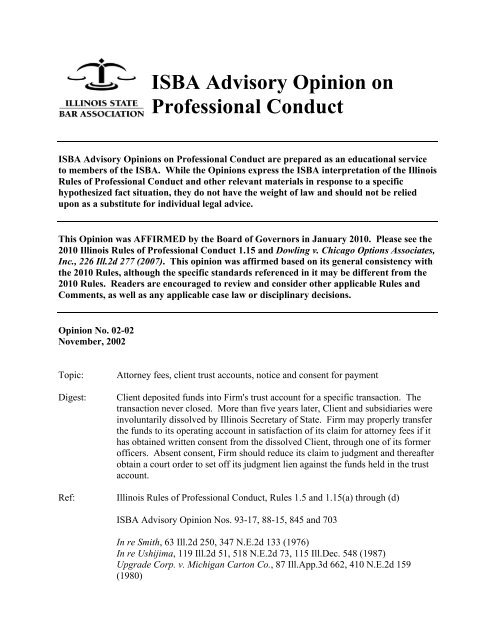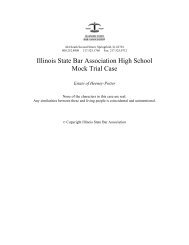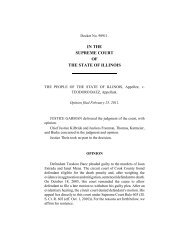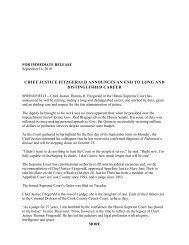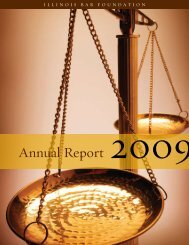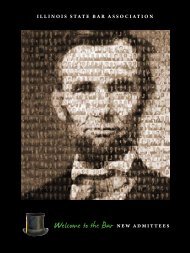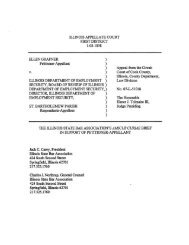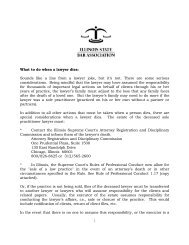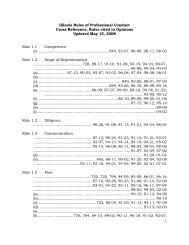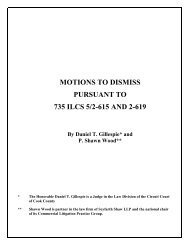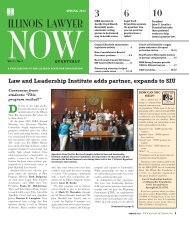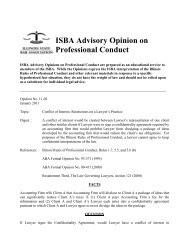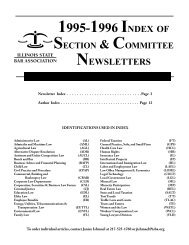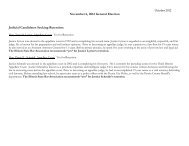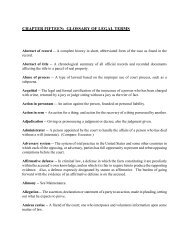ISBA Advisory Opinion on Professional Conduct - Illinois State Bar ...
ISBA Advisory Opinion on Professional Conduct - Illinois State Bar ...
ISBA Advisory Opinion on Professional Conduct - Illinois State Bar ...
You also want an ePaper? Increase the reach of your titles
YUMPU automatically turns print PDFs into web optimized ePapers that Google loves.
<str<strong>on</strong>g>ISBA</str<strong>on</strong>g> <str<strong>on</strong>g>Advisory</str<strong>on</strong>g> <str<strong>on</strong>g>Opini<strong>on</strong></str<strong>on</strong>g> <strong>on</strong>Professi<strong>on</strong>al C<strong>on</strong>duct<str<strong>on</strong>g>ISBA</str<strong>on</strong>g> <str<strong>on</strong>g>Advisory</str<strong>on</strong>g> <str<strong>on</strong>g>Opini<strong>on</strong></str<strong>on</strong>g>s <strong>on</strong> Professi<strong>on</strong>al C<strong>on</strong>duct are prepared as an educati<strong>on</strong>al serviceto members of the <str<strong>on</strong>g>ISBA</str<strong>on</strong>g>. While the <str<strong>on</strong>g>Opini<strong>on</strong></str<strong>on</strong>g>s express the <str<strong>on</strong>g>ISBA</str<strong>on</strong>g> interpretati<strong>on</strong> of the <strong>Illinois</strong>Rules of Professi<strong>on</strong>al C<strong>on</strong>duct and other relevant materials in resp<strong>on</strong>se to a specifichypothesized fact situati<strong>on</strong>, they do not have the weight of law and should not be reliedup<strong>on</strong> as a substitute for individual legal advice.This <str<strong>on</strong>g>Opini<strong>on</strong></str<strong>on</strong>g> was AFFIRMED by the Board of Governors in January 2010. Please see the2010 <strong>Illinois</strong> Rules of Professi<strong>on</strong>al C<strong>on</strong>duct 1.15 and Dowling v. Chicago Opti<strong>on</strong>s Associates,Inc., 226 Ill.2d 277 (2007). This opini<strong>on</strong> was affirmed based <strong>on</strong> its general c<strong>on</strong>sistency withthe 2010 Rules, although the specific standards referenced in it may be different from the2010 Rules. Readers are encouraged to review and c<strong>on</strong>sider other applicable Rules andComments, as well as any applicable case law or disciplinary decisi<strong>on</strong>s.<str<strong>on</strong>g>Opini<strong>on</strong></str<strong>on</strong>g> No. 02-02November, 2002Topic:Digest:Ref:Attorney fees, client trust accounts, notice and c<strong>on</strong>sent for paymentClient deposited funds into Firm's trust account for a specific transacti<strong>on</strong>. Thetransacti<strong>on</strong> never closed. More than five years later, Client and subsidiaries wereinvoluntarily dissolved by <strong>Illinois</strong> Secretary of <strong>State</strong>. Firm may properly transferthe funds to its operating account in satisfacti<strong>on</strong> of its claim for attorney fees if ithas obtained written c<strong>on</strong>sent from the dissolved Client, through <strong>on</strong>e of its formerofficers. Absent c<strong>on</strong>sent, Firm should reduce its claim to judgment and thereafterobtain a court order to set off its judgment lien against the funds held in the trustaccount.<strong>Illinois</strong> Rules of Professi<strong>on</strong>al C<strong>on</strong>duct, Rules 1.5 and 1.15(a) through (d)<str<strong>on</strong>g>ISBA</str<strong>on</strong>g> <str<strong>on</strong>g>Advisory</str<strong>on</strong>g> <str<strong>on</strong>g>Opini<strong>on</strong></str<strong>on</strong>g> Nos. 93-17, 88-15, 845 and 703In re Smith, 63 Ill.2d 250, 347 N.E.2d 133 (1976)In re Ushijima, 119 Ill.2d 51, 518 N.E.2d 73, 115 Ill.Dec. 548 (1987)Upgrade Corp. v. Michigan Cart<strong>on</strong> Co., 87 Ill.App.3d 662, 410 N.E.2d 159(1980)
Client Trust Account Handbook of the ARDC, Secti<strong>on</strong> IV.B.Uniform Dispositi<strong>on</strong> of Unclaimed Property Act, 765 ILCS 1025/1, et seq.FACTSFor almost 20 years, Law Firm A ("Firm") served as outside counsel to an <strong>Illinois</strong> corporati<strong>on</strong>and several of its affiliated and subsidiary companies (collectively referred to as "Client"). Inearly 2000, Client ceased doing business and the <strong>Illinois</strong> Secretary of <strong>State</strong> subsequentlydissolved Client late in 2000 for failure to file its Annual Report and pay its franchise taxes.There was <strong>on</strong> deposit in Firm's trust account m<strong>on</strong>ies that had been wired into the account severalyears earlier by Client for a transacti<strong>on</strong> that did not close. Client had directed Firm to keep thefunds until further notice. Firm received no further instructi<strong>on</strong>s.Client currently owes Firm legal fees and costs in excess of the amount held in the trust account.Firm believes that under <strong>Illinois</strong> law it has a comm<strong>on</strong> law retaining lien <strong>on</strong> funds currently heldin the trust account. Firm also understands that ordinarily, an attorney may transfer funds whichhe is holding in trust for his client to pay attorney fees after reas<strong>on</strong>able notice to the client andc<strong>on</strong>sent by the client.QUESTIONSMust Firm serve written notice and obtain c<strong>on</strong>sent to the transfer of Client's funds from Firm'strust account to its operating account in satisfacti<strong>on</strong> of unpaid legal fees? If so, to whom shouldnotice be given of Firm's intenti<strong>on</strong> to transfer the funds? What alternatives are available to Firmif it is incapable of serving written notice?OPINIONAssuming that the fees are reas<strong>on</strong>able (Rule 1.5(a)), we turn to Rule 1.15 for guidance. Inparagraph (c) we observe:When in the course of representati<strong>on</strong> a lawyer is in possessi<strong>on</strong> of property in which boththe lawyer and another pers<strong>on</strong> claims interest, the property shall be kept separate by thelawyer until there is an accounting and severance of their interests. If a dispute arisesc<strong>on</strong>cerning their respective interests, the porti<strong>on</strong> in dispute shall be kept separate by thelawyer until the dispute is resolved.We know that the Firm claims an interest in the funds held in trust. Although not stated in thefacts, we assume that any remaining creditors as well as the former shareholders of the dissolvedcorporati<strong>on</strong> would also claim interest in the funds held in trust. Firm should c<strong>on</strong>tinue to complywith Rule 1.15(c) by keeping segregated the entire amount of Client's funds until this issue isresolved.2
We have previously c<strong>on</strong>sidered the payment of attorney fees from a client trust account; howeverwe find most of the <str<strong>on</strong>g>Opini<strong>on</strong></str<strong>on</strong>g>s to be distinguishable from the facts before us. For example, in<str<strong>on</strong>g>Opini<strong>on</strong></str<strong>on</strong>g> 703, we c<strong>on</strong>sidered what c<strong>on</strong>stituted a retainer and whether the retainers were theclient's funds. In the present case, the funds held in trust were not delivered for retainerpurposes.In <str<strong>on</strong>g>Opini<strong>on</strong></str<strong>on</strong>g> 845, we gave guidance to a law firm, which was unable to remit judgment proceeds itreceived <strong>on</strong> behalf of a foreign client because the client was dissolved, and the law firm wasunable to locate a representative of the dissolved client. The law firm asserted no claim to thefunds held in trust. In that <str<strong>on</strong>g>Opini<strong>on</strong></str<strong>on</strong>g> we observed:The law firm should deposit the judgment payments in its trust account and then makereas<strong>on</strong>able efforts to notify the officers and/or directors of the dissolved foreign corporati<strong>on</strong>of the receipt of the funds. Depending <strong>on</strong> the amount of funds involved, reas<strong>on</strong>able effortswould likely include such things as: sending a certified letter, return receipt requested, to aknown individual associated with the corporati<strong>on</strong> at the last available address, withinstructi<strong>on</strong>s for the Post Office to forward and with a request that the return receipt show theaddress where delivered; asking the Post Office to provide a forwarding address; c<strong>on</strong>tactingthe Secretary of <strong>State</strong> of the state of incorporati<strong>on</strong> for names and addresses of officers and/ordirectors; hiring a skip tracing service; and/or hiring a private detective.If an officer and/or director of the dissolved corporati<strong>on</strong> cannot be located after makingevery reas<strong>on</strong>able effort c<strong>on</strong>s<strong>on</strong>ant with the amount of funds involved, the law firm shouldc<strong>on</strong>tinue to preserve the funds of its client by maintaining the funds in its trust account.The law firm should then comply with the provisi<strong>on</strong>s of the Uniform Dispositi<strong>on</strong> ofUnclaimed Property Act....In <str<strong>on</strong>g>Opini<strong>on</strong></str<strong>on</strong>g> 88-15 the questi<strong>on</strong> presented was whether the attorney could withdraw m<strong>on</strong>ies that hewas holding for his client as payment toward his attorney fees. In that case, the attorney waspaid a retainer in a criminal case. At the c<strong>on</strong>clusi<strong>on</strong> of the case, the client owed attorney anadditi<strong>on</strong>al $4000 in excess of the retainer. Prior to serving his sentence, the client asked theattorney to hold $3500 for him, which was deposited in the attorney's trust account. Whileincarcerated, the client asked the lawyer to withdraw certain m<strong>on</strong>ies for the defendant.Subsequent to the client's relies from incarcerati<strong>on</strong>, the client made further claim to the fundsheld in the trust account. In its <str<strong>on</strong>g>Opini<strong>on</strong></str<strong>on</strong>g>, which is reproduced in full, the Committee stated:The attorney may transfer funds which he is holding for his client to pay the attorney'sfees provided the attorney gives written notice to the client of his intenti<strong>on</strong> to withdrawthe m<strong>on</strong>ey and the client affirmatively c<strong>on</strong>sents in writing or otherwise.Although the Code does not require c<strong>on</strong>sent in writing, the <strong>Illinois</strong> Supreme Court'sopini<strong>on</strong> in In re Ushijima, 119 Ill.2d 51, 518 N.E.2d 73 (1987), suggests that writing ispreferable. In that case, relevant to the present questi<strong>on</strong>, an attorney's authority towithdraw funds from a trust account to pay attorney's fees was disputed and the Courtnoted that the Hearing Board of Attorney Registrati<strong>on</strong> and Disciplinary Commissi<strong>on</strong> hadc<strong>on</strong>cluded that the authority should have been in writing.3
<str<strong>on</strong>g>Opini<strong>on</strong></str<strong>on</strong>g> 93-17 involved the co-mingling of funds and the payment of fees from the client trustaccount. There, the attorney agreed to serve as an escrow agent for the buyer and seller of realestate and deposited into his trust account funds provided by the buyer. When the transacti<strong>on</strong>closed the seller asked the attorney to deliver the escrowed funds. Some six m<strong>on</strong>ths later, theattorney remitted <strong>on</strong>ly a small fracti<strong>on</strong> of the funds together with a letter explaining that the sumrepresented the "net proceeds" after the attorney's fees were deducted. The client denied that anym<strong>on</strong>ey was due the attorney and asserted that the attorney was already paid in full for hisservices. We opined that the attorney could not deduct his fees from the funds held in the trustaccount because the attorney had not notified the client of his intent to do so nor had the clientc<strong>on</strong>sented. In c<strong>on</strong>cluding that the attorney's acti<strong>on</strong>s were improper we found that:Attorney's interest in the funds arises out of attorneys right to a comm<strong>on</strong> law retaininglien. Such lien entitles him to retain possessi<strong>on</strong> of any property bel<strong>on</strong>ging to the clientthat comes into his possessi<strong>on</strong> as part of the professi<strong>on</strong>al relati<strong>on</strong>ship until amounts duehim for services rendered have been paid....The <str<strong>on</strong>g>Opini<strong>on</strong></str<strong>on</strong>g> then cited two disciplinary cases as well as the <strong>Illinois</strong> Appellate Court decisi<strong>on</strong> inUpgrade Corp. v. Michigan Cart<strong>on</strong> Co., 87 Ill.App.3d 662, 410 N.E.2d 159 (1980), whichdefined a retaining lien as a comm<strong>on</strong> law possessory lien in favor of an attorney for his fees.Finally, we find the Client Trust Account Handbook published by the <strong>Illinois</strong> Supreme Court'sAttorney Registrati<strong>on</strong> and Disciplinary Commissi<strong>on</strong> to be instructive. At Secti<strong>on</strong> IV, C, 2, theHandbook states:Before an earned legal fee may properly be withdrawn from a trust account, the clientshould be given notice of the nature of the services rendered and the amount of the legalfee proposed to be paid to the lawyer. See In re Smith, 63 Ill.2d 250, 347 N.E.2d 133(1976). If no objecti<strong>on</strong> is received within a reas<strong>on</strong>able time, the lawyer may withdrawthe fee from the trust account.This of course presupposes a prior agreement between the lawyer and the client that the lawyerup<strong>on</strong> notice to the client, will deduct earned legal fees from the amount the lawyer is holding intrust as well as the fact that it presumes that the client is in existence and capable of resp<strong>on</strong>ding,which may not be the case in the facts before us. Accordingly, it would be misplaced reliance <strong>on</strong>Smith for the Firm to simply send notice to the last known address of the dissolved client andwithdraw the funds within a reas<strong>on</strong>able time thereafter.Firm has a retaining lien within the meaning of Upgrade Corp. However, before Firm pays thelegal fees from its trust account, it should take steps to transform its retaining lien to a judgmentand obtain an order of court directing the Firm to pay the funds held in trust to the Firm via anappropriate acti<strong>on</strong>.A final caveat: If Firm knows or believes that Client filed bankruptcy, the funds held in trustwould c<strong>on</strong>stitute assets of the debtor's estate and Firm would have the duty to disclose existenceof the assets to the Trustee. Thereafter, it can assert its comm<strong>on</strong> law retaining lien.4
* * *5


